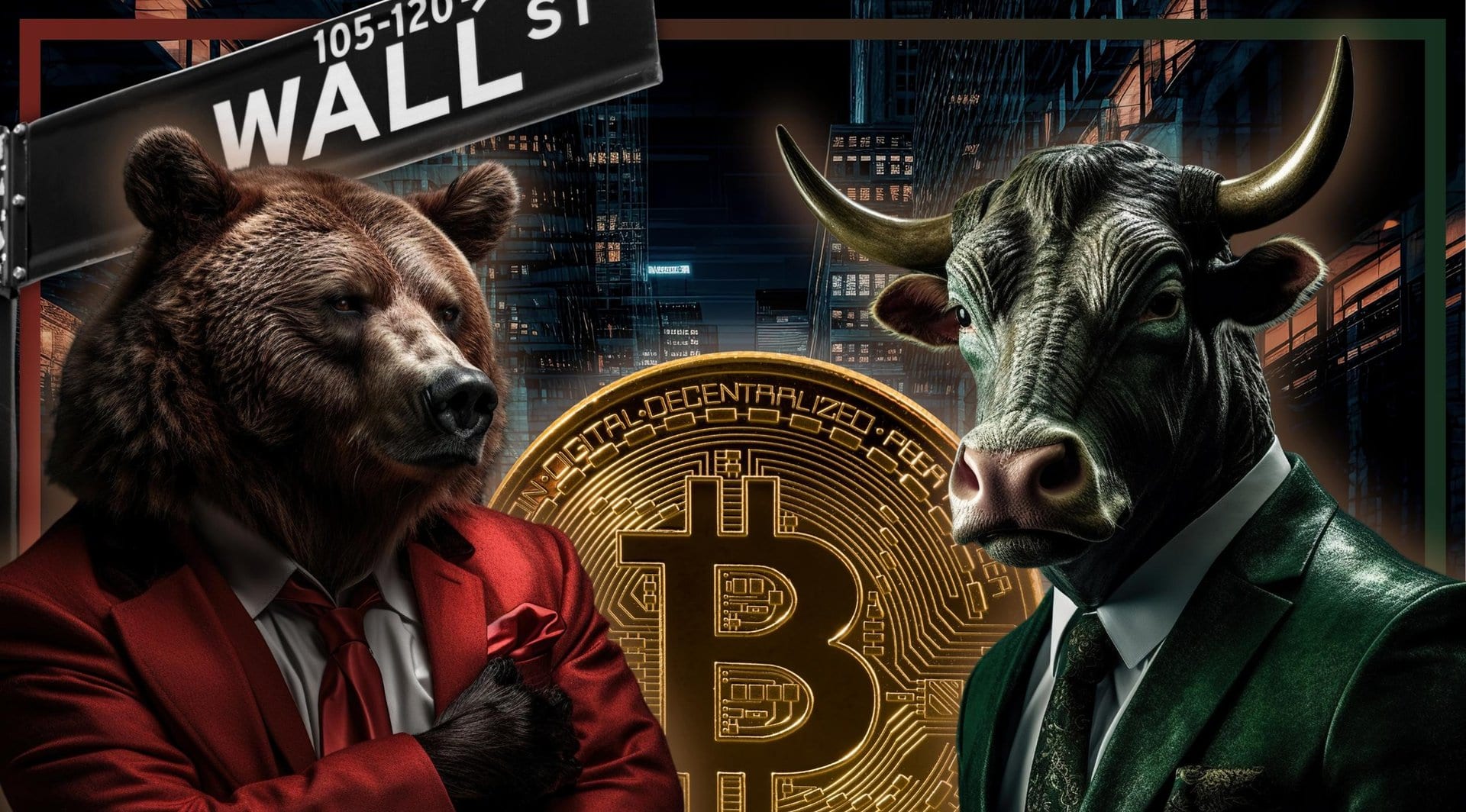During the stunted recovery from the subprime mortgage crisis, cryptocurrency was first conceived as a challenge to the hegemony of Wall Street and traditional finance (TradFi) – the insiders and middlemen who charge exorbitant fees and ultimately disadvantage retail investors. This activist spirit infused and animated the movement which sprung up around Bitcoin.
However, now more than a decade later, the opposite has happened, Wall Street is now capturing cryptocurrency markets to reinforce its hegemony.
With the industry facing a withering onslaught by the SEC, the banks think there’s blood in the water and this is the time to pounce. TradFi wants to reshape the ecosystem, turning the big players in digital assets into their clients.
Wall Street warms to the tokenization
Like the International Monetary Fund (IMF), Wall Street sees every situation as a ripe opportunity for more of its own services. When you’re holding a hammer, everything looks like a nail.
Wall Street’s leading lights are wary of cryptocurrencies like Bitcoin and Ether. Some think that digital assets with underlying conventional securities or derivatives have more promise. This might be tokenized real-world assets like art or real estate, which Boston Consulting Group estimates could become a $16 trillion industry by 2030.
This has already begun to take place in the art market, where service providers have sprung up to partition the ownership of works of art. The benefit is that tokenization offers a similar promise like Bitcoin did in the early days, eliminating intermediaries, as well as reducing the time and transaction costs involved in investing in these markets.
Considering how exclusive and illiquid some asset classes like art and real estate have become, the potential benefits are significant.
In theory, fractionalized ownership could make these markets more accessible to small investors. In practice, the tokenized asset markets will likely be hotbeds for fraud and theft. Criminals seem to intuitively understand how to abuse them while regulators invariably misunderstand and fear them.
However, in this respect, TradFi will have much to offer, having extensive past dealings with regulators, but retail investors end up with exposure to the same group of thieves that screwed them over in the subprime mortgage crisis.
TradFi RECON
TradFi stalwarts like Goldman Sachs, BNY Mellon, Charles Schwab, JP Morgan, Blackrock, and Fidelity are all looking to take over market share in the digital asset ecosystem. They are exploring a variety of products and services such as staking, custody, and a plan to exploit blockchain to trade bonds.
The latter has been in development for some time, but there is precious little to show for these ventures thus far.
Blackrock filed with the SEC to launch the first Bitcoin ETF in June.
Not to be left out, JP Morgan poses itself as a pioneer in decentralized finance (DeFi) with “Institutional DeFi.”
Some TradFi stalwarts change their tune
In 2021, Ken Griffin, billionaire CEO of Citadel LLC and owner of Citadel Securities, called crypto a “jihadist call” against the dollar.
Then, one year later in 2022, Griffin gushed, “Crypto has been one of the great stories in finance over the course of the last fifteen years.”
Like many other billionaires, Griffin, the 40th richest person in the world, had previously compared the Bitcoin craze to the tulip bulb mania, warning that investors didn’t know what they were investing in.
Now, the nuts and bolts of crypto haven’t changed, he’s pushing to get involved. Griffin is not alone in this pivot.
Blackrock CEO Larry Fink called bitcoin “an index of money laundering,” but now he says it is “digitizing gold,” sounding like Michael Saylor, executive chairman of Microstrategy. Jamie Dimon called Bitcoin a fraud for years, but he came around and later said he regretted saying that.
Crypto has slowly won over the IMF, as well, which strenuously warned about the risks to the global financial system for years.
However, major Wall Street and global banks have long been interested in crypto’s underlying blockchain technology, including Goldman Sachs, Barclays, JP Morgan, State Street, UBS, Royal Bank of Scotland, Credit Suisse, and BBVA.
Government regulation to combat the crypto threat
Perhaps, it’s a question of putting the cart before the horse. If deep-pocketed investors insist on putting their money into Bitcoin, it’s not surprising that hedge funds and market-makers such as Citadel Securities want a piece of it. What’s curious is the hyperbolic stance that Griffin and others held against the crypto space until they suddenly changed their minds.
Why? The promise of regulation may be part of it. Regulation, necessary as it may be, serves those with billions of dollars at their disposal much more so than the average retail investor. With billions of dollars, one can flout the rules or just pay a pesky fine, admit no guilt, and move on.
Citadel Securities was fined $700,000 by FINRA, Wall Street’s self-regulator, for intentionally delaying clients’ equity orders to front-run the trades on their own account. Citadel Securities didn’t contest the charge. $700,000 is a drop in the ocean.
Bitcoin reacts to Wall Street
Cryptocurrency markets get hot and bothered when Wall Street comes along stomping and snorting. The recent rally in crypto markets was greatly driven by favorable news about Wall Street’s increasing involvement.
Bitcoin maximalists and crypto-libertarians who are prevented by ideology from celebrating the union of digital assets and TradFi will be the ones late to the party when the day of their nuptials arrives. They deserve each other, really.
Imagine how hard Wall Street traders will shill for shitcoins! I can say with near certainty that there will be more retirements lost by seniors to shitcoin rug pulls after Wall Street joins the party. The letters on Molly White’s keyboard are going to be worn away with all the blogs she’ll be writing.
And that’s as it should be. There are many benefits that TradFi will bring to the digital asset ecosystem. Allow me to enumerate them.
TradFi will challenge Centralized Exchanges
Many crypto whales will stay loyal to Kraken and Coinbase or their favorite Decentralized Exchange, but institutional investors by and large require the centralization that only TradFi can provide.
TradFi will bring institutional trappings to the exchange market, driving up the transaction costs and offering better cyber security and potentially (at some time in the distant future) Federal Deposit Insurance Corporation (FDIC) investment guarantees, which crypto-native firms have only been able to lie about in the recent past.
The SEC has left no doubt that it will not allow companies from the crypto ecosystem to manage the institutionalization of digital assets. Gary Gensler is a loyal henchman of the Wall Street players. He acts only for their benefit and likely with their express approval. As a former partner, head of Media, and co-head of Finance at Goldman Sachs, they are his friends and colleagues, after all.
Just in time, Fidelity Digital Assets, Charles Schwab and Citadel Securities recently launched EDX Markets, a new crypto exchange. Presumably, EDX will have better security and investor protection than the CEXs that have easily succumbed to ruinous exploits. Hopefully, that will put pressure on the more established players in the market to raise the bar on security and protection of depositors’ money.
Segregating Broker-Dealer and the Exchange Function
A top complaint from U.S. regulators is that CEXs have a conflict of interest because they can run the table, to the detriment of depositors who have no visibility into how the exchange handles funds entrusted to its custody.
No one needs to think back very far before a TradFi institution exploiting the same conflict of interest and screwing over their depositors pops up, but this argument is bandied about by TradFi practitioners and unquestioning journalists with minor caveats.
This move by TradFi will likely put pressure on both CEX and DEX which do not currently segregate these functions because it suits their interest.
Who let the Bots out?
High frequency-trading bots have been unleashed on digital asset markets, and they make money by using volatility to their advantage. However, working in concert, these bots also gradually reduce volatility, which if it befell Bitcoin or Ethereum, would increase the attractiveness of those markets considerably for investors looking for stability.
However, given the rampant fraud and hacks in digital markets, volatility may prove resilient, which is all well and good for TradFi. Day traders and hedge funds that exploit minute margins will be drawn to these markets as long as they didn’t completely implode.
The deeper narrative may be that digital assets have emerged through enough boom-bust cycles now that some former critics have felt exhausted by the resilience of cryptocurrency price levels. Many expected them to reach $0.00, but Bitcoin has sustained $30,000 now for a month, cutting against the narrative that digital assets are a Ponzi scheme.
The Coming Battle for Bitcoin
Reporters and bloggers have been blathering about Wall Street doing this or that regarding digital assets for years. It has been seen as inevitable that traditional financiers would get involved in the new game in town, but in reality, the path for Wall Street to get exposure on their own terms has been long and torturous.
And it’s not surprising when you consider that most places where people buy digital assets are terrible counterparties for Wall Street banks or asset managers. TradFi institutions would like to supplant Coinbase and Binance et al., while these big CEX are rolling out the red carpet in hopes that their traders will become new clients.
Matthew Sigal, head of digital assets research at VanEck, told the Washington Post, “Assets often move from weak hands to strong heads during a bear market,” but that’s not what’s happening. It’s not a bear market, Bitcoin has been steady or rising recently. Instead, Wall Street wants to dislodge crypto-native competitors in the digital asset space.
Nevertheless, we should cheer this battle for the future of digital assets because retail investors will be the beneficiaries.
Author: Tim Tolka, writer, journalist, and BI researcher
The editorial team at #DisruptionBanking has taken all precautions to ensure that no persons or organizations have been adversely affected or offered any sort of financial advice in this article. This article is most definitely not financial advice.















